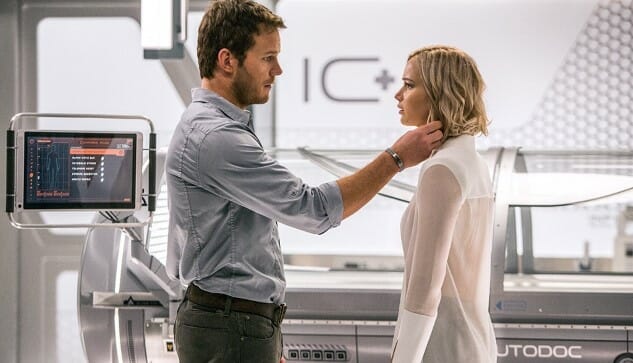Passengers
Photo: Jaimie Trueblood/Columbia Pictures Industries, Inc.
You may have noticed that Hollywood doesn’t really make traditional “romantic comedies” any more.
Oh sure, there’s the occasional film that tangentially fits the bill. But say, Annie Hall? When Harry Met Sally? Hell, even the likes of You’ve Got Mail—these are the types of films that are no longer being made in 2016, at least by major studios. As a single word of explanation, they’re just too sincere for the Tinder generation, and that’s coming from a Millennial who met his girlfriend on Tinder. Multiplex audiences are both too cynical and too accustomed to genre crossovers to accept a simple romance, unless that movie is also a prestige drama or liberally dosed with a twist of action, science fiction, apocalypse fiction or superheroes. Straight “romance” is now the stuff of indie filmmaking. And that’s how we end up with the likes of Passengers.
We end up with Passengers when a room full of executives experiences a collective, earth-shattering orgasm at the realization that they get to produce a movie with a Chris Pratt/Jennifer Lawrence “sex scene” in it. Unfortunately for them, the film feels like they settled on the actors playing the leads before they’d ever taken a gander at the script…presumably because they were still in shock from the aforementioned moment of ecstasy, which must have been powerful indeed, and resulted in some serious clean-up.
Passengers plays like a film whose script was picked from a pile and deemed “acceptable,” as long as Pratt and Lawrence were there to star. “Nobody’s gonna care about the story,” you can practically hear an oily haired, clichéd producer caricature saying. “We got stars in this picture, young man. Mostly nude stars!”
 This is an actual poster for the film. They legitimately thought that the two stars in it were the only thing necessary to put on the poster.
This is an actual poster for the film. They legitimately thought that the two stars in it were the only thing necessary to put on the poster.
-

-

-

-

-

-

-

-

-

-

-

-

-

-

-

-

-

-

-

-

-

-

-

-

-

-

-

-

-

-

-

-

-

-

-

-

-

-

-

-








































